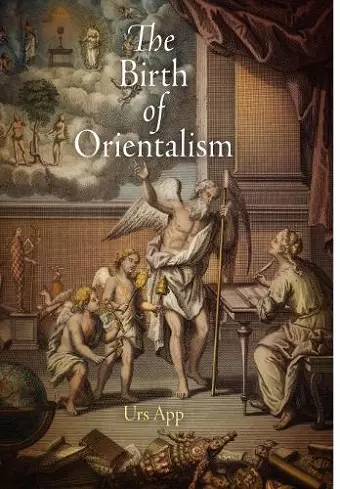The Birth of Orientalism
Format:Paperback
Publisher:University of Pennsylvania Press
Published:30th Oct '15
Currently unavailable, and unfortunately no date known when it will be back

Modern Orientalism is not a brainchild of nineteenth-century European imperialists and colonialists, but, as Urs App demonstrates, was born in the eighteenth century after a very long gestation period defined less by economic or political motives than by religious ideology.
Based on sources from a dozen languages, many unavailable in English, The Birth of Orientalism presents a completely new picture of this protracted genesis, its underlying dynamics, and the Western discovery of Asian religions from the sixteenth to the nineteenth century. App documents the immense influence of Japan and China and describes how the Near Eastern cradle of civilization moved toward mother India. Moreover, he shows that some of India's purportedly oldest texts were products of eighteenth-century European authors.
Though Western engagement with non-Abrahamic Asian religions reaches back to antiquity and can without exaggeration be called the largest-scale religiocultural encounter in history, it has so far received surprisingly little attention—which is why some of its major features and their role in the birth of modern Orientalism are described here for the first time. The study of Asian documents had a profound impact on Europe's intellectual makeup. Suddenly the Bible had much older competitors from China and India, Sanskrit threatened to replace Hebrew as the world's oldest language, and Judeo-Christianity appeared as a local phenomenon on a dramatically expanded, worldwide canvas of religions and mythologies. Orientalists were called upon as arbiters in a clash that involved neither gold and spices nor colonialism and imperialism but, rather, such fundamental questions as where we come from and who we are: questions of identity that demanded new answers as biblical authority dramatically waned.
"A genuinely important book. It has the potential to change the way that we think about seventeenth- and eighteenth-century European encounters with the East, and about how Eastern ideas deeply influenced the thought of formative Western thinkers."—Jonathan Silk, University of Leiden
"A great work. It establishes the ground on which all future studies of European orientalism will have to build, it rewrites the stories that scholars of religious history have been telling about the Western discovery (invention?) of Hinduism and Buddhism, it offers indispensable analyses of influential writers both famous (Bayle, Diderot, Voltaire) and now obscure, and it is a model of a truly global study of intellectual history."—Eighteenth-Century Fiction
"App's fascinating work fills a huge lacuna in the history of ideas, one that most scholars did not know existed. It shows that for the last five centuries Asia and Europe have been more intimately and consistently intertwined at the intellectual level than anyone had suspected. It will no doubt be the foundation stone of future research in the area, as well as bringing a new critical perspective to bear on the many studies that have been devoted to the nineteenth century continuation of the European reception of Asian thought."—Japanese Journal of Religious Studies
"A brilliant archaeology of the emergence of Orientalism as a scholarly discipline through the seventeenth and eighteenth centuries . . . App shows us the dusty roads we Orientalists have traveled, and reminds us as nicely as he can that much of that dust is still on our saddle bags."—Journal of Chinese Religions
"Urs App's magnificent book rises as a massive—and massively erudite—bulwark against this common assumption [that Orientalism was a product of modern colonial encounters]. A new classic in the historiography of scholarship, it reinvigorates the broad-minded approach of Frank Manuel's work, adding to it the sophistication achieved in the intervening decades of historical writing, as well as a polyglotism that few intellectual historians of Europe can hope to rival."—Intellectual History Review
"App's book immerses its readers in the world of Enlightenment comparative religion and casts important new light on eighteenth-century European speculations about ancient Asian culture."—The American Historical Review
- Winner of Winner of the 2012 Book Prize from the Academie des Inscriptions et Belles-Lettres 2021
ISBN: 9780812223460
Dimensions: unknown
Weight: unknown
568 pages